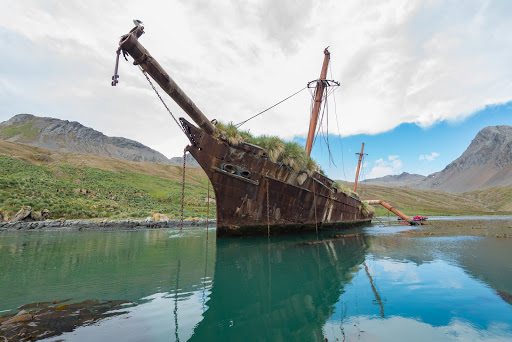Having arrived South Georgia in the early morning and cruising in Drygalski Fjord we anchored at Cooper Bay where we all entered the zodiacs and cruised around along the coast. Fur seals and macaroni penguins were in an abundance in the area and we were also visited by giant petrels, leopard seals, a few chinstrap and king penguins. We were also lucky to see the island’s only songbird, the South Georgia pipit. As a bonus we even got to see a leucistic seal pup, one that had a full white coat. While looking almost cuter than the rest (if that was possible) these kinds of seals usually don’t survive to adulthood as they are easy targets by predators.
Arriving in South Georgia.
Macaroni and chinstrap penguins.
Leucistic seal pup.
Antarctic tern (rear) and arctic tern (front).
During lunch we relocated to Gold Harbor where we landed where we got to walk among a large king penguin colony. The white chests, yellow markings and orange beaks really stood out in the large groups. These were mixed up with skuas, sheathbills and a few pairs of light-mantled sooty albatrosses were nesting in the area. While overcast the weather was nice, but when leaving the beach again the swell had increased so some zodiacs had problems getting people into the boats due to the large waves coming in. Our zodiac got hit by at least three large waves during loading leaving no one dry.
King penguin colony at Gold Harbor.
Loading the zodiac to return to the ship.
Photo taken by unknown passenger.
The following morning the plan had been to land in St. Andrews Bay but when the guides were scouting the location the winds picked up from 25 knots to 60 knots, making any operation impossible. Looking at them returning in the ship it was obviously not fun trying to handle the zodiac while alongside the ship unloading guides and equipment. Instead we went to Ocean Harbour where the weather was significantly better and had a zodiac cruise. Here there was a flurry of giant-, cape-, and wilson’s storm petrels, all seemingly in the middle of a feeding frenzy. In the bay there was a rusted old wreck of the ship Bayard. On what had previously been a deck grass had grown and a group of shags had nested there.
Wilson's storm petrel.
South Georgia pipit.
Bayard (or what's left of it).
In the afternoon we entered the old whaling station Grytviken. Here we got to see Shackleton’s grave and have a relaxing walk around, seeing the old whaling equipment, the small museum and generally just enjoying the view in what turned out to be excellent weather. All the while trying to stay at a respectable distance from fur seals and king penguins. Grytviken is maintained by a small crew keeping it running and maintained, and when ships like ours visit they do a raffle and a handful of people get to go onto the ship and join a meal there. While they do get decent food on land, there are limits to the freshness so getting on board where the storage facilities are potentially better is always a great treat. It was a great evening with and outdoor barbecue on the rear deck.
Cloud formations outside Grytviken.
Coming in to Grytviken.
Despite being built according to code some buildings still need to be tied down to stabilize due to the weather.
Barbecue on the ship.
During the crossing of the Drake we all went through a thorough bio-security check to make sure we wouldn’t transfer any seeds, small insects or similar to the places we would be visiting. Outer layers of clothes, bags and whatnot went through a thorough check to make sure they were clean before being approved. And when leaving and returning to the ship we walk through disinfectant and were required to manually clean our boots to make sure nothing was hiding in any crevasse. South Georgia and the Falklands have been working hard to get rid of invasive species, so in South Georgia, before leaving to visit Grytviken, someone from Grytviken came on board and did a check of everyone before getting into the zodiacs. We were informed that last year only one ship managed to unload passengers without having turn anyone around and have them do extra cleaning. Our guides must have been fantastic teachers as we were informed that we had had a 100% success rate when leaving the ship. Well done!














No comments:
Post a Comment